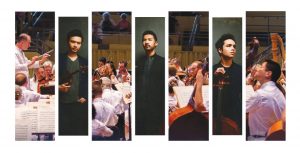
After a chamber music concert Monday afternoon, the JCT Trio — pronounced “Junction” Trio — will unite with the Chautauqua Symphony Orchestra to perform Ludwig van Beethoven’s Concerto for Violin, Cello and Piano in C major, Op. 56.
The concert will take place at 8:15 p.m. Tuesday, July 9 in the Amphitheater. Alongside the Beethoven piece, which is often known simply as Beethoven’s Triple Concerto, the orchestra will perform classical Finnish composer Einojuhani Rautavaara’s “Cantus Arcticus”: Concerto for Birds and Orchestra, Op. 61; and classical Czech composer Bedřich Smetana’s From Bohemia’s Forests and Meadows from “Má vlast” (My Fatherland).
Rossen Milanov, conductor and CSO music director, said the concert’s pieces are inspired by nature and fit Week Three’s theme: “A Planet in Balance: A Week in Partnership with National Geographic Society.”
Milanov said the opening piece, Rautavaara’s “Cantus Arcticus,” meshes orchestral music with recorded birdsong.
“It’s in three movements, and each of the movements features a tape of recorded birdsong that simultaneously play with the orchestra,” Milanov said. “There are infinite possibilities as the orchestral instruments mix with those actual birdcalls. … It’s a very beautiful, very evocative piece.”
Milanov said the piece presents a unique challenge for the orchestra.
“It’s interesting, combining the recording of something that happens naturally, such as the birdcalls, with an orchestra,” Milanov said. “The challenge is for the musical instruments to fit into the tape and have those dialogues with the birds.”
The next piece is Smetana’s From Bohemia’s Forests and Meadows. Milanov said the piece is inspired by a moment of cultural establishment, and Smetana drew from central European folklore and identity to capture his country’s natural beauty.
“Smetana was a composer from the second half of the 19th century, when each of the small European nations were establishing their own culture, their own folklore, their own identity,” Milanov said. “He creates … moments of grandeur, leading you into the forest where all sorts of fantastic creatures could exist. It’s a very poetic, very romantic piece.”
Milanov said the JCT Trio will join the orchestra for the concert’s final piece, the Triple Concerto, “which in itself is quite an original idea because Beethoven combines a string trio — normally an ensemble that performs chamber music — with a full orchestra.”
JCT Trio pianist Conrad Tao said the group’s name, which contains all three members’ last initials, is pronounced “Junction” because of the members’ different backgrounds and shared joy in music.
“Each of us do our own thing, and there’s a lot of overlap between the three of us, but there’s also quite a lot of distinctness between us — what our careers look like, what we’re interested in,” Tao said. “So when we play together, it’s just about wanting to play together.”
Tao said the members chose a simple name to reflect their paths meeting in a series of performances.
“It’s actually very simple — for me, it feels like a place where I can just dive into the pure joy and pleasure of making music with friends and playing pieces that we really love,” Tao said. “So in naming it, nothing excruciatingly poetic would do; ‘junction’ feels right — it’s just us playing together in a dynamic meeting of sorts.”
Tonight, that meeting will include the CSO and the Triple Concerto.
Concertos are a type of composition that feature a solo part backed by a large orchestra. Tao said the Triple Concerto is somewhat unique in that it includes three solo parts — making it the natural choice for the trio, who each have extensive backgrounds as soloists.
“This is an anomaly of a concerto; I don’t think there’s very many concertos for three soloists and an orchestra,” Tao said.
Tonight’s concert, Tao said, will be the first time the three musicians play the Triple Concerto together for an audience. He said the piece provides a unique opportunity for pianists.
“In a piano trio repertoire, I think pianists are usually given music that is guiding the overall structure, because the instrument has a large range of sound,” Tao said. “In the Triple Concerto, the orchestra provides all of that context and all of that sense of a larger musical environment, where I, as a pianist, am much more like Stefan (Jackiw) or Jay (Campbell) where the music I’m making is just lyrical and melodic.”
Campbell, cellist of the JCT Trio, said the Triple Concerto is also unique in its light tone.




